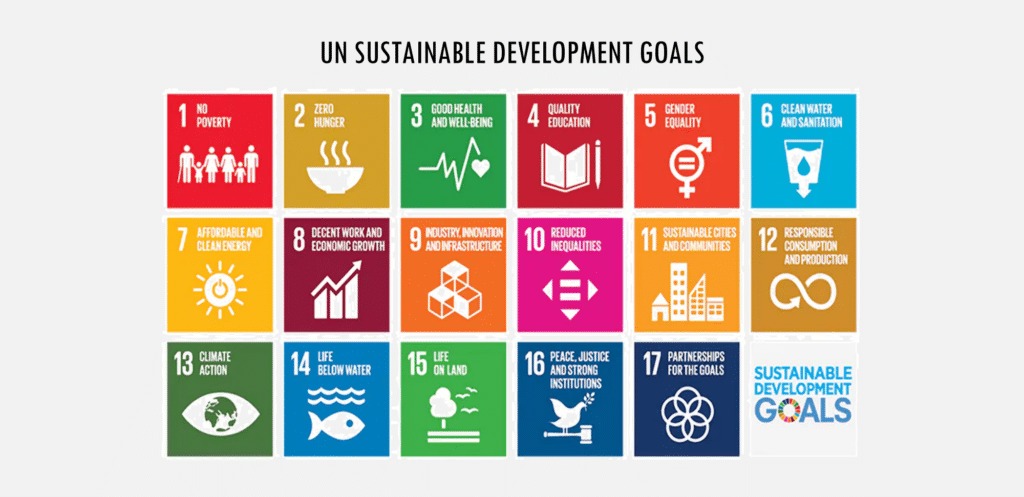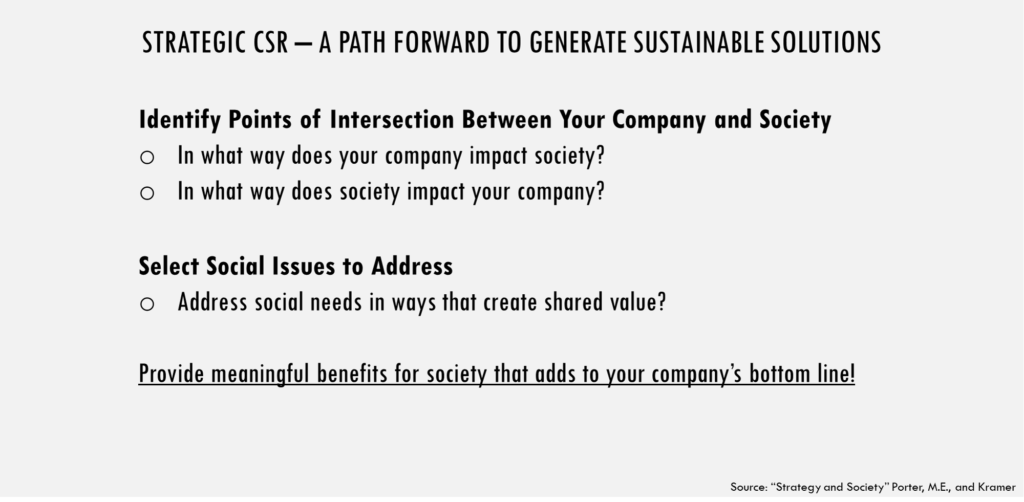The importance of CSR
Corporate Social Responsibility (CSR) is no longer a nice to have addition to our overall business plan; it has now become a must have. Mankind’s impact on global weather is no longer a debatable topic, it’s a fact. You know it. Your employees know it. Your suppliers know it. And, most of all, your customers know it. Unless you can demonstrate a real effort to lower your carbon footprint and have less impact on the environment, you’re going to have a problem keeping customers and talented employees. You may even lose some supplier relationships as they, too, feel this environmental impact pressure and look more closely at your role in sustainability just as you look closer at theirs.
COVID changed the way of doing business
COVID has had a major impact on how we conduct business. This impact will continue long after we move from a pandemic to a more manageable endemic situation. Supply chains were severely damaged and are still recovering. Employee attitudes about how and where they work have adjusted to a new reality that has less in-person face-to-face interaction. What binds us to our workplace and our co-workers is less about the personal relationships that bound us together in a previous world. Now more than ever before, it is the mission and purpose of the business we are working together in that binds us…or not.
Maslow’s Hierarchy
We have no doubt come across Maslow’s Motivational Hierarchy at some stage in our careers. Sociologists are now telling us that Maslow’s original self-oriented motivations have evolved. No longer is it about attaining self-actualization, where I come to understand who I am and why I matter to myself; it is about achieving a sense of purpose, where I am more motivated by how I matter to the world around me.

A shift in career motivations across generations
The Millennial generation from where you are now drawing your employees is very different from Generation X and especially the Boomer Generation they blame for most of the world’s current problems. They get it and they are pretty sure the rest of us don’t. Previous generations were focused on their own future based on their own needs and wants. Millennials are a step beyond that; they have a broader focus. A lot of Boomers and Xers are getting it, too. Why do you think Bill Gates, once the richest man in the world, gave up his career at Microsoft and donated a large proportion of his wealth to create a charity committed to eliminating some of the greatest global problems, such as eradicating malaria or providing sustainable clean drinking water in Africa?
Issues that impact work and career motivations

During my teaching experience at Dartmouth’s Tuck, one of the leading business schools in the world, or at Europe’s Maastricht School of Management, or even in Catholic Universidad in Peru, I saw the choices my MBA students made about where they worked becoming increasingly less about the best financial offer, which in the past was typically from Goldman Sachs, big banks, and hedge funds which they now shun. Instead, they strive to work in businesses such as Hello Fresh in Germany, which is on a mission to get us all to eat better with a locally sourced supply chain, or in green energy companies such as Convergent Energy in North America that proudly states their mission is to build an energy landscape that is less expensive, more reliable, and increasingly sustainable—one that benefits our employees, our communities, our customers, and our planet.
So, the question is not whether you’re going to make sustainability a core component of your overall business plan; it’s just a matter of when.
How to choose the best CSR path?
But how do you choose the best purpose, the best sustainability path for your company? Start by understanding that sustainability isn’t just about the planet. Sustainability goes beyond designing green products and packaging or reducing energy consumption. It entails improving business operations and processes to become more efficient, with a goal of dramatically reducing costs and waste. It is also about insulating a business from the risk of resource price shocks and shortages. We are learning about insulating our business from price shocks and supply chain reliability the hard way right now.
Move from CSR to Corporate Value Creation
We need to change our perspective from CSR to corporate value creation.

Old-school thinking about CSR was about duty and responsibility. That’s Procter & Gamble putting skylights in their manufacturing plants to reduce energy consumption or Coca-Cola working harder at reducing waste from packaging. Coca-Cola still has to do their part to reduce waste, but they need to do better so they are focusing on the every drop counts initiative to not only encourage consumers to balance the choice of beverages for better health but also to learn how to reclaim lost wetlands and provide better water purification in developing countries. It’s not just about water for their local bottling plants but also includes local communities. Coca-Cola is focusing on women’s empowerment in Turkey and LGBTQ rights in markets like Hungary and Poland. This isn’t just the right thing to do, it also connects the Coca-Cola brand value pillar of inclusion to practical applications that matter to their consumers in those countries.
Water sustainability, women’s empowerment, and LGBTQ rights are just a few of the many issues Coca-Cola could have gotten involved with. But they chose initiatives that not only had the biggest impact on stakeholders but also had the biggest impact on helping them achieve their business goals like reducing costs, protecting the supply and affordability, increasing brand equity, and minimizing employee turnover. Getting involved in and impacting the issues that matter specifically to your business and improving your sustainability, competitiveness, and profitability moves you from Corporate Social Responsibility to Strategic CSR.
The UN has identified 17 important sustainable development goals (SDGs). As seen in the example I’ve cited, Coca-Cola is engaged in seven of these. So, you should focus on which ones for a better strategy? Which ones would help your business get to where you want to be?

Strategic CSR for Stakeholders
Before we get too far along in determining what matters, let’s take a step back and ask ourselves who it matters to. Your company’s success is closely linked to the success of all your stakeholders. COVID was a vivid example of the importance of the integrated ecosystem your business is part of.
Professor Edward Freeman of the Darden School of Business at the University of Virginia detailed the Stakeholder Theory of organizational management that serves as a template for identifying both internal and external stakeholders – both matter.

A pair of business professors at Harvard Business School, Michael Porter, and Mark Kramer developed a set of assessment tools that you can use to first identify all the things you are doing that impact your internal stakeholders (inside/out assessment) and then assess the impact external stakeholders and their situation have on your business (outside/in assessment). They coined the phrase Strategic CSR as a means of generating sustainable solutions for your business.

Assessing company impact on society: inside-out
Let’s first look at the inside-out assessment, as that is the area you are most in control of.

As you can see, strategic CSR should be a companywide, multi-function initiative. Make it a part of your annual business planning process for each department head. Identify the impact the company is having on society and the planet as well as on other stakeholders, such as employees and suppliers. A comprehensive assessment should give you the information you need to establish the priorities you want to focus on in how you operate and interact within your businesses ecosystem. It was this sort of assessment that enabled British retailer Marks & Spencer to reduce the number of plastic grocery bags by 2.8 billion and ensure that 100% of their fresh fish suppliers are using or assertively moving toward sustainable fishing operations.
Assessment outside-in
Next, you want to look outside at the various areas in which the world you live in is impacting your ability to successfully sustain and grow your business’s success.

It was this sort of assessment, and particularly point #4 (People and Resources) that led Microsoft to get involved in technology and software programming education wherever they had development facilities. When I was responsible for developing our marketing capabilities in Eastern Europe after the fall of communism, I knew we had a lot of catching up to do on developing local marketing, so we created a marketing class taught by my team at Corvinus University in Budapest (formerly Karl Marx School of Economics). I still teach there today. Their international studies program has been a constant source of Garrison Group talent and for our clients.
Samsung, when they were looking to build a facility in Central Europe, chose a location between Budapest and the Slovak border that was near both the cultural attractions Budapest offered for management and a steady and less expensive blue-collar labor supply from Slovakia.
Dairy company Danone realized there are few big dairy farms operating in India, so they adapted their supply chain from big tanker trucks to small vehicles that each effectively services 1-3 of the hundreds of thousands of dairy farmers in the country.
Prioritize your strategies
Now that you have identified the major issues impacting your business using both an inside/out and an outside/in assessment tool, you need to prioritize them. Again, we can look to the academic world where they are leading the way in developing tools for businesses to more strategically deal with sustainability and CSR. Michael Blowfield from the University of Oxford’s Smith School of Enterprise and the Environment in the UK has developed an effective tool that will help you take what you learn from your inside/out and outside/in assessments and put it into a prioritization framework.

As you can now see, the sweet spot is all those initiatives that fall in the upper right corner of the prioritization tool; these are the initiatives that will have the greatest impact on the number of internal and external stakeholders as well as their importance in helping the company achieve its business objectives.
Avon: Turning a Brand Into a Cause
During the worst of the financial crisis in 2009, Avon in Russia identified a number of factors that impacted their business success that they could turn into an advantage with their direct selling network, such as the consumer’s decreased spending power. But they were losing several hundred thousand representatives to competitors who were offering even better pricing. Avon say they are A Company for Women. Here was their chance to prove it by building their brand equity with women and reducing their representative turnover.
Define a comprehensive sustainability plan
Sustainability and CSR are increasingly important. These tools will help you choose the initiatives that matter most to your business and its stakeholders. To be competitive going forward, you will need to demonstrate what you are doing regarding sustainability and CSR. You will be asked to do so again and again by potential employees you want to recruit, by customers who have a choice in what brands they buy, and by communities and governments that support your growth objectives. The risks to not developing a comprehensive sustainability plan have never been clearer, just as the opportunities to grow your business exponentially multiply when you do. Eighteenth-century German philosopher Johann Wolfgang von Goethe said the following about the importance of momentum: Whatever you dream you can do, begin it. Boldness has genius, power, and magic in it. Begin it now.




